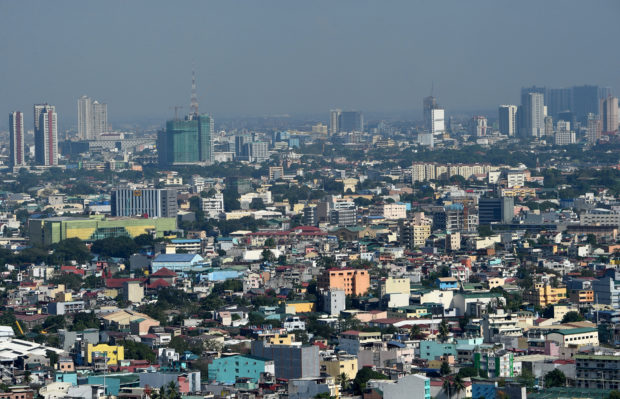
This photo taken on Jan. 29, 2019, shows a general view of the Manila skyline. (File photo by TED ALJIBE / Agence France-Presse)
Manila, Philippines — The Philippines dropped by four spots in the yearly global competitiveness report by the Switzerland-based International Institute for Management Development (IMD), amid a number of global uncertainties ranging from inflation to geopolitical issues.
According to the 2023 World Competitiveness Yearbook (WCY) by IMD, the Philippines ranked 52nd this year out of 64 countries included in the report, down four spots from 48th place last year.
Compared to its peers in the Asia-Pacific region, the Philippines continued to stay in 13th place out of 14 countries for six consecutive years.
Professor Arturo Bris, director of the World Competitiveness Center, said this year’s results reflected the impact of different crises, including global inflation, the COVID-19 pandemic and the war in Ukraine.
The report ranks countries using 255 criteria spread across four competitiveness factors: economic performance, government efficiency, business efficiency, and infrastructure.
IMD’s local partner, the Asian Institute of Management (AIM) said that 162 of the indicators were based on hard data gathered from national sources.
On the other hand, the remaining indicators were based on perception, drawn from an executive opinion survey of mid- and upper-level managers in each of the economies included in the WCY.
AIM said the Philippines recorded declines in three out of four main factors or dimensions of competitiveness.
The country’s business efficiency factor fell from 39th in 2022 to 40th in 2023, while its infrastructure factor, which it characterized as a perennial challenge for the Philippines, also dropped from 57th in 2022 to 58th in 2023.
Biggest fall
The Philippines’ government efficiency factor suffered the biggest fall, recording a four-place drop from 48th in 2022 to 52nd in 2023.
The academic institute noted that all the subfactors under the Philippines’ government efficiency factor declined compared to the previous year, with public finance going from 51st to 55th, tax policy from 13th to 14th, institutional framework from 53rd to 56th, business legislation from 52nd to 57th, and societal framework from 50th to 53rd.
In contrast, the country’s economic performance factor improved by 13 places, going from 53rd place in 2022 to 40th this year.
The subfactors under the economic performance factor that saw improvements this year include the domestic economy, which rose from 48th spot to 30th, employment from 19th to 9th and prices from 58th to 39th place.
“Some of the challenges that the Philippines faces in 2023 include sustaining economic recovery and growth momentum amidst global downside risks, strengthening social protection and health-care systems for inclusive development, addressing learning gaps to improve local education system, investing in sustainable infrastructure to reduce climate change vulnerability and reinforcing efficient public management strategies to support fiscal responsibility,” AIM said in a statement.
